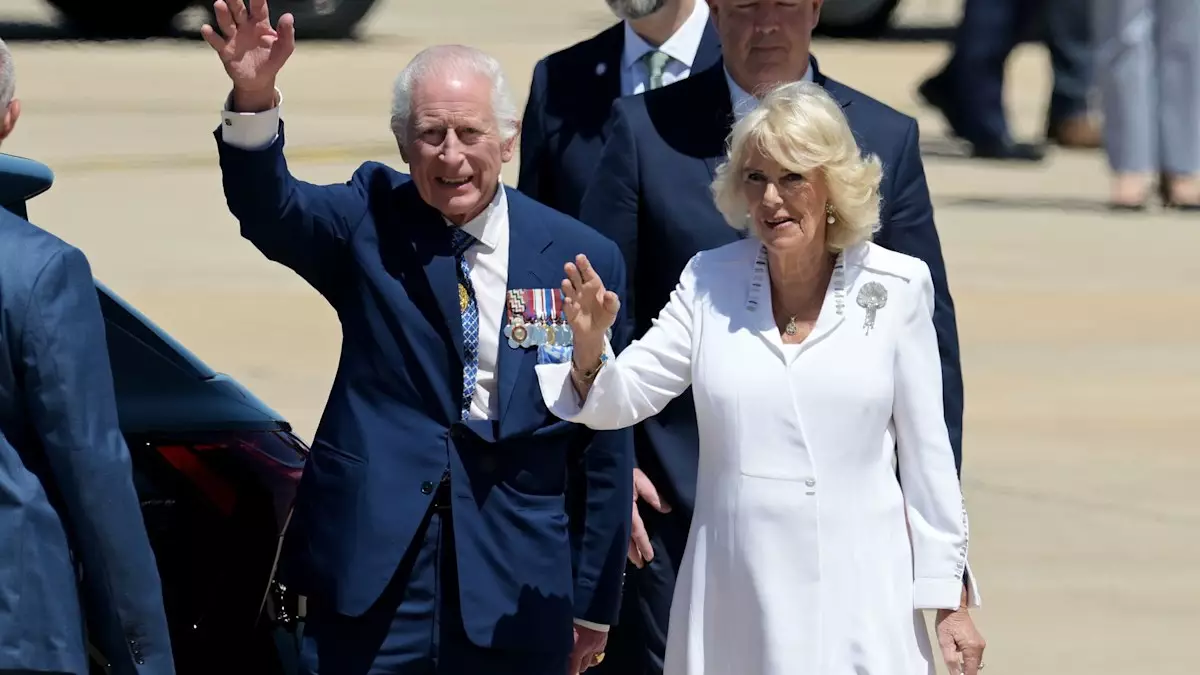In an affectionate display of regal charm, King Charles and Queen Camilla arrived in Canberra on Monday, marking a notable return to Australia’s capital after nearly a decade. This visit is layered with significance not only because of the time elapsed since their last appearance, but also in the context of King Charles’ recent health revelations. Dressed impeccably in an elegant white silk crepe dress by esteemed designer Anna Valentine, Queen Camilla embodied grace and sophistication, her ensemble accentuated by a remarkable diamond and pearl brooch, a cherished heirloom from the late Queen Elizabeth.
As they traversed the welcoming scene, it became clear that their presence was meaningful for many Australians who gathered in earnest. King Charles’ connection to Australia extends beyond ceremonial obligations; he previously spent six transformative months as a teenager in Australia, which adds a layer of personal history to his travels. This particular visit, significant in its own right, is underscored by the King’s announcement earlier in the year regarding his battle with cancer, prompting a robust public engagement that seems to encapsulate both admiration and empathy.
A poignant stop on their itinerary was made at the Australian War Memorial, where the royal couple laid a floral tribute at the Tomb of the Unknown Australian Soldier. This act not only commemorated the sacrifice of Australian servicemen and women but also illustrated the deep respect the monarchy holds for the nation’s military history. The last visit to this memorial by the royals was recorded in 2015, making this moment rich with reflection and solemnity.
Interestingly, the crowd that turned out to witness their arrival spanned various opinions on the monarchy’s relevance in modern Australia. Among them was Georgia Bray, a self-proclaimed republican, who spoke to the gathering with a spirit of unity: “I’m a republican but today I’m a monarchist,” she stated, underscoring an Australian ethos of politeness and hospitality. The gathering was also marked by unabashed enthusiasm; Lynton Martin from Melbourne, donned a flamboyant crown and Union Jack suit, eagerly anticipating another meeting with the King after having met him in Sydney the day prior. This juxtaposition of sentiments in the crowd encapsulates the complex nature of contemporary republicanism and monarchy in Australia.
Engaging with Australia’s Environmental Challenges
An essential aspect of King Charles’ visit was his interest in Australia’s environmental challenges, notably the devastating bushfires that have impacted the continent in previous years. At the National Bushfire Behaviour Research Laboratory, he participated in a demonstration of a cutting-edge wind tunnel, aptly named the “pyrotron.” This exhibit emphasized Charles’ lifelong commitment to environmental advocacy, showcasing how the monarchy is intertwined with pressing contemporary issues facing the nation.
Beginning their Australian journey in Sydney, the couple was met with overwhelming support from well-wishers who gathered outside St. Thomas’ Anglican Church after a service. The palpable excitement within the crowd served as a reminder of the enduring affection that Australians have for the British royal family. Their enthusiasm resonates deeply, acting as a bridge that links tradition with modern sensibilities.
The royal couple’s tour will continue with further engagements in Sydney and an upcoming trip to Samoa, where they plan to participate in discussions around the British Commonwealth. For King Charles, this journey is more than a royal obligation; it underscores his dedication to fostering relationships within the Commonwealth, strengthening the bonds that unite these diverse nations despite geographical divides.
Charles’ return to Australia symbolizes not just a royal visit, but also a reaffirmation of his lifelong causes. As he faces personal health challenges, this engagement becomes emblematic of resilience—echoing his commitment to serve and represent in even the most trying of times. Ultimately, this Australian tour serves as a testament to the evolving nature of monarchy, where tradition intersects with personal history, public sentiment, and pressing global issues.

